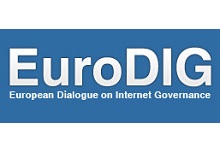Global digital governance: Can technical solutions respond to policy questions?
19 Jun 2019 11:00h - 12:20h
Event report
[Read more session reports and live updates from the EuroDig 2019]
The plenary session focused on whether technical solutions can be implemented for tackling political issues. Divided in two parts, the session featured a multistakeholder panel with representatives from the Italian government, technical community, civil society, and businesses. The first part of the session was moderated by Mr Maarten Botterman (Director, GNKS Consult) who introduced the lightning session in which the panellists talked about how 2030 might look like. The second part of the session was moderated by Ms Emily Taylor (CEO, Oxford Information Labs) and focused on the political actions required to embrace new technical solutions that are sustainable, supportive of human dignity, and contributive to the sustainable development goals (SDGs).
Mr Jonathan Cave (Professor, Alan Turing Fellow, University of Warwick) explained that in 2030, power shifts will probably make current issues and assumptions insupportable and irrelevant. The current tension between concepts such as privacy and cybersecurity might be resolved in the future. Such issues are deeply related to topics such as data access and power to use data, and they might be addressed by focusing on who wishes to control the data, with what purpose and scope. While the status quo features a variety of legal tools with various degrees of effectivity, regulatory approaches should be principle based and should facilitate statutory rules and restrictions with duties of care. Giving somebody who is in a position to see and evaluate situations the possibility to experiment with different ways to deal with such situations is probably a more effective way than regulations dictating what should be done. In addition, concepts of accountability and transparency will not be achieved unless there is a deep understanding, that is not limited to how an algorithm works, of new technologies and their impact on society.
Ms Jaya Baloo (Chief Information Security Officer, KNP) introduced a scenario in which trust in hardware and software is achieved through introducing liability for the people who are responsible for their own security, instead of focusing on certification processes, which can undermine innovation in the start-up culture. This approach can give control, identity, and data ownership back to the users. Additionally, in order to achieve fundamental stability and security, proactive approaches such as banning sales of spyware and zero day vulnerabilities and promoting a culture of peace should be implemented. These are first-world created challenges that will affect the developing world, which does not have the same infrastructures and capacities to face and tackle them.
Mr Mattia Fantinati (Under State Secretary for Public Administration, Italy) spoke of the role of governments in the information and communications technology field, which is exponential and growing disruptively at times. Governments and policymakers should assume a future-oriented role. Policymakers are required to develop long-term strategies considering the exponentially evolving digital and technological scenario in order to be effective. Fantinati further explained that in order to achieve the maximisation of digitalisation, further efforts need to be implemented to tackle the digital divide between people and businesses, and to digitise public sector services to tackle issues related to interoperability and data security.
Ms Anriette Esterhuysen (Director of global policy and strategy, Association for Progressive Communications) gave a civil society perspective to the panel. Complementing Fantinati’s argument, she explained that policymakers are required to develop long-term strategies meant to address current challenges of the status quo such as, but not limited to, inequalities, the extent of the digital divide, and the impact of digitalisation on jobs. At the same time, such strategies need to have a long-term vision to ensure effectivity in an exponentially evolving digital and technological scenario. Nevertheless, regulation is not enough, there is a need for norms, standards, and safety nets. Following this line, the approach needs to be humancentric, focusing on the protection of individual rights.
Mr Bill Woodcock (Executive Director, Packet Clearing House) added a technical community perspective to the panel, arguing that, as a society, we should be aware of two existential threats: the destruction of the environment, and the automation of the exploitation of human psychological weaknesses. There are things that the human brain can do, which are well understood by current research and can be exploited by machines in a vast quantity very quickly. In addition, technologies like bitcoin have negative impacts on the environment. For instance, the environmental footprint of a second life avatar is bigger than the environmental footprint of a Brazilian citizen. Such industry created threats need to be tackled in the next ten years. In order to achieve a healthy digital environment by 2030, effective regulation of digital platforms should be developed, and the excessive power and influence of digital giants should be addressed.
By Stefania Pia Grottola
Related topics
Related event

